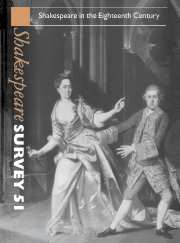Book contents
- Frontmatter
- Shakespeare and the Eighteenth Century: Criticism and Research
- Daddy’s Girls: Shakespearian Daughters and Eighteenth-Century Ideology
- Shakespeare and Clarissa: ‘General Nature’, Genre and Sexuality
- Early Georgian Politics and Shakespeare: The Black Act and Charles Johnson’s Love in a Forest (1723)
- Race Mattered: Othello in Late Eighteenth-Century England
- From Pericles to Marina: ‘While Women are to be had for Money, Love, or Importunity’
- ‘A Thousand Twangling Instruments’: Music and The Tempest on The Eighteenth-Centruy London Stage
- Double Falsehood and the Verbal Parallels with Shelton’s Don Quixote
- Eighteenth-Century Performances of Shakespeare Recorded in the Theatrical Portraits of the Garrick Club
- Eighteenth-Century Editing, ‘Appropriation’, and Interpretation
- Shakespeare Survey: Beginnings and Continuities
- Destined Livery? Character and Person in Shakespeare
- Prejudice and Law in The Merchant of Venice
- ‘Many A Civil Monster’: Shakespeare’s Idea of the Centaur
- Shakespeare’s International Currency
- Repeopling the Globe: The Opening Season at Shakespeare’s Globe, London 1997
- Shakespeare Performances in England, 1997
- Professional Shakespeare Productions in the British Isles, January–December 1996
- TheYear's Contributions to Shakespeare Studies: 1 Critical Studies
- 2 Shakespeare’s Life, Times, and Stage
- 3 Editions and Textual Studies
- Books Received
- Index to Volume 51
- General Index to Volumes 41–50
Eighteenth-Century Editing, ‘Appropriation’, and Interpretation
Published online by Cambridge University Press: 28 March 2007
- Frontmatter
- Shakespeare and the Eighteenth Century: Criticism and Research
- Daddy’s Girls: Shakespearian Daughters and Eighteenth-Century Ideology
- Shakespeare and Clarissa: ‘General Nature’, Genre and Sexuality
- Early Georgian Politics and Shakespeare: The Black Act and Charles Johnson’s Love in a Forest (1723)
- Race Mattered: Othello in Late Eighteenth-Century England
- From Pericles to Marina: ‘While Women are to be had for Money, Love, or Importunity’
- ‘A Thousand Twangling Instruments’: Music and The Tempest on The Eighteenth-Centruy London Stage
- Double Falsehood and the Verbal Parallels with Shelton’s Don Quixote
- Eighteenth-Century Performances of Shakespeare Recorded in the Theatrical Portraits of the Garrick Club
- Eighteenth-Century Editing, ‘Appropriation’, and Interpretation
- Shakespeare Survey: Beginnings and Continuities
- Destined Livery? Character and Person in Shakespeare
- Prejudice and Law in The Merchant of Venice
- ‘Many A Civil Monster’: Shakespeare’s Idea of the Centaur
- Shakespeare’s International Currency
- Repeopling the Globe: The Opening Season at Shakespeare’s Globe, London 1997
- Shakespeare Performances in England, 1997
- Professional Shakespeare Productions in the British Isles, January–December 1996
- TheYear's Contributions to Shakespeare Studies: 1 Critical Studies
- 2 Shakespeare’s Life, Times, and Stage
- 3 Editions and Textual Studies
- Books Received
- Index to Volume 51
- General Index to Volumes 41–50
Summary
Eighteenth-century literary editing, of Shakespeare as well as Milton and other authors, has sometimes been characterized as tending to alter and construe the text in the light of distinctively eighteenth-century, and often distinctively personal, tastes and knowledges. That view has been subject to especially serious and repeated challenge in the last few years, but survives at some points in the writings of distinguished Shakespearian commentators, including Margreta de Grazia and Gary Taylor. In my own study of the subject, Shakespeare, Milton, and Eighteenth-Century Literary Editing (Cambridge University Press), to some of the materials and arguments of which this essay will recur, I have attempted to demonstrate that a number of the significant works of eighteenth-century scholarship and scholarly editing are based on coherent and often well-formulated theoretical understandings of interpretation, which profess to establish authorial readings, and to understand an original, authorially intended, meaning.
- Type
- Chapter
- Information
- Shakespeare Survey , pp. 125 - 140Publisher: Cambridge University PressPrint publication year: 1998
- 1
- Cited by

